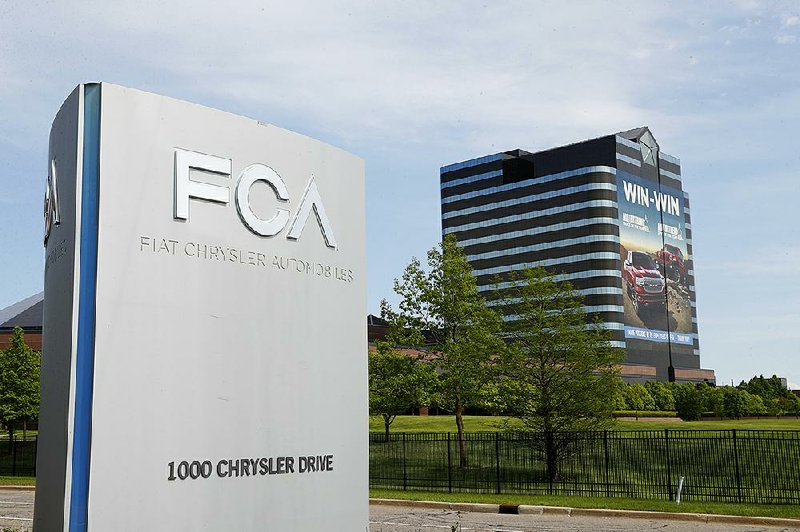PARIS -- A merger between Renault and Fiat Chrysler will happen only if French jobs are protected, France's finance minister said Tuesday.
Speaking on RTL radio, Bruno le Maire said he has asked for "four guarantees" for the deal to go ahead, including that not a single job or factory on French soil will disappear.
"The first: industrial jobs and industrial sites. I told Renault Chairman Jean-Dominique Senard very clearly that it was the first of the guarantees I wanted from him in the opening of these negotiations with Fiat," le Maire said. "A guarantee on the preservation of industrial jobs and sites in France."
Fiat Chrysler has proposed to merge with France's Renault to create the world's third-biggest automaker, worth $40 billion, and combine forces in the race to make electric and autonomous vehicles. The merged company would produce some 8.7 million vehicles a year, leapfrogging General Motors and trailing only Volkswagen and Toyota.
Le Maire said he also wants the merger to take place within the alliance between Renault and Nissan, that French interests "be well represented" on the board of the new organization, and that the future operation commits to the development of electric batteries in Europe.
He added that if a deal is secured, France's stake in Renault will go down to 7.5% from 15%.
Renault is expected to give preliminary approval to Fiat Chrysler's merger proposal as soon as next week after briefing the French carmaker's two Japanese partners, according to people familiar with the matter.
Renault aims to convene a board meeting to move forward with the plan, based on a timetable agreed upon during negotiations last week with Fiat Chrysler, said the people, who asked not to be identified because the details are confidential.
Senard, who would become chief executive officer of the enlarged auto group, will attend a scheduled monthly meeting this morning in Japan for the board overseeing the alliance among Renault, Nissan Motor Co. and Mitsubishi Motors Corp. He will seek to explain the rationale of the transaction to the partners.
While Fiat Chrysler and Renault aren't seeking a merger with Nissan for now, the companies plan to eventually invite Nissan and Mitsubishi to join forces, the people said.
Representatives for Renault and Fiat declined to comment.
Automakers have collaborated more in recent years as they come under pressure to invest heavily in developing electric cars, self-driving vehicles and in-car connectivity. Regulators, particularly in Europe and China, are pushing automakers to produce electric vehicles and meet tougher climate-change regulations, pressure that grew after scandals over the amount of pollutants emitted by gas and diesel-powered engines.
A deal would save $5.6 billion a year for the merged companies by sharing research, purchasing costs and other activities, Fiat Chrysler said. It promised the deal would involve no plant closures, but it didn't address potential job cuts.
The companies are largely complementary: Fiat Chrysler is stronger in the U.S. and SUV markets, while Renault is stronger in Europe and in developing electric vehicles. Analysts say both companies are weak in China, which is now the world's largest auto market.
"This operation will bring benefits to both countries," Fiat Chrysler Chairman John Elkann told reporters in Italy, noting that it had been 10 years since Fiat's takeover of bankrupt Chrysler, in exchange for small-car technology and management know-how.
The car market has shifted dramatically in the meantime, with Fiat Chrysler abandoning small cars in the United States in favor of SUVs.
Analysts at financial firm Jefferies said it was "hard to disagree with the logic" of the deal, as there is a strong fit in the markets each company covers and the brands they offer.
"The elephant in the room is who will run the entity," analysts Philippe Houchois and Himanshu Agarwal wrote in a note to investors.
Mergers of equals can be difficult to manage over questions of who gets the top leadership positions and which brands are promoted and invested in most. A tie-up between Daimler and Chrysler in the 1990s was billed as a merger of equals, but it eventually collapsed over cultural differences and recriminations.
Investors were nevertheless enthusiastic about Fiat Chrysler's plan, pushing the company's shares up 7.2% and Renault's 12.7%.
The French government, which owns 15% of Renault, said it is "favorable" to the idea of a merger but wants to study the conditions more carefully, especially in terms of "Renault's industrial development" and employees' working conditions, government spokesman Sibeth Ndiaye said. "We need giants to be built in Europe."
The merger idea is the biggest corporate move so far by Fiat Chrysler chief executive Mike Manley, who took his position after the unexpected death last year of the charismatic leader Sergio Marchionne.
Information for this article was contributed by Angela Charlton, Colleen Barry, Yuri Kageyama, Sam Petrequin and David Koenig of The Associated Press and by Tommaso Ebhardt, Aaron Kirchfeld and Tara Patel of Bloomberg News.
Business on 05/29/2019
